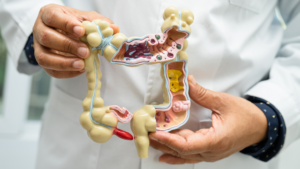Regain Quality of Life: Medical Cannabis and Gastrointestinal Disorders
According to the American Gastroenterological Association, 60-70 million people in America are living with gastrointestinal disorders. While there are many gastrointestinal (GI) disorders and diseases, common disorders of the gut include acid reflux/gastroesophageal reflux disease, celiac disease, colon polyps, Crohn’s disease, colitis, constipation, diarrhea, diverticular disease, gastroenteritis, IBS (Irritable Bowel Syndrome), IBD (Inflammatory Bowel Disease), pancreatitis, and certain cancers affecting the GI system.
The Connection Between Cannabis and Gastrointestinal Disorders
With so many Americans having issues living with inflammatory bowel diseases and the increased availability of medical cannabis, there has been a rise in the quest to understand the relationship between cannabis and gastrointestinal disorders through research and understanding peoples’ experiences.
In this article, we look at some of the research and perspectives surrounding cannabis and gastrointestinal disorders to explain why so many people are getting their medical cannabis cards to help manage the symptoms of these uncomfortable conditions.
Gut Diseases are Prevalent in America
While 60-70 million Americans live with diagnosed gastrointestinal disorders, a 2022 study revealed that up to 40% of Americans have stopped routine activities in the last year due to issues with their bowels, such as exercising, running errands, and spending time with family and friends.
This revealing research should tell you that if you’re living with symptoms of inflammatory bowel disease such as chronic abdominal pain, severe nausea, and vomiting, or are finding yourself spending more time on the toilet than you’d certainly like to, you’re not alone. The same research showed that we all don’t like to talk about issues surrounding the bowel – even with our doctors!

While a few GI diseases are hereditary, stress, diet, lifestyle, bacteria (good and bad), and viruses can influence your gut health. However, as we have stressed in many of our articles in our patient education series, the endocannabinoid system is a critical player in gut health, as well as the way most of our bodies function.
The Endocannabinoid System and Gut Health
As we discussed in our article about the connection between cannabis and appetite, our digestive system has some special parts that can be affected by the endocannabinoid system (ECS).
One part of the ECS called CB1, or cannabinoid receptor 1, can be found in different gut components like the stomach’s lining, muscles, and some nerve areas. Another part called CB2, or cannabinoid receptor 2 is mainly in some special cells in the gut lining. Cannabinoid receptors are also in some bodily cells that influence digestion.
The endocannabinoid system is responsible for ensuring that everything is operating within the body in a balanced way. As prominent cannabis researcher Dr. Ethan Russo states, the endocannabinoid system acts as “a key mediator of physiological homeostasis, thus ensuring that various bodily systems function within tight parameters with neither a deficiency nor excess of activity”.
More research is beginning to emerge that supports that the endocannabinoid system plays a significant role in the gut and is essential for maintaining the balance within the intestines and bowels. This intricate system is involved in regulating critical functions, including the immune response, movement of the gut, how we perceive and experience sensations associated with abdominal pain through the Brain-Gut Axis, and secretion of various substances (aka. the time we spend on the toilet).
When the endocannabinoid system is not functioning properly, it can contribute to the development of several gastrointestinal disorders such as diverticulitis, celiac disease, irritable bowel syndrome (IBS), inflammatory bowel disease (IBD), and colorectal cancer (CRC).
Cannabis and Abdominal Pain
One of the top reasons that people get their medical cannabis card is for pain management. Abdominal pain is one of the most common symptoms of gastrointestinal disorders and can be quite debilitating, and more people are turning to medical cannabis as a means to manage the abdominal pain associated with GI disorders.
In a 2013 study in the journal Inflammatory Bowel Diseases, researchers conducted a survey involving 292 patients with irritable bowel disorder, or IBD. The study revealed that 12% of the participants were active users of marijuana for medicinal and recreational purposes, while 39% were former users. Those who used marijuana products for their IBD symptoms, whether current or former users, reported significant relief in their abdominal pain, nausea, and diarrhea. They described marijuana as “very helpful.”

In another study from 2018, published in the Journal of Pediatrics, researchers found that nearly one-third of 99 IBD patients had used marijuana. Among these users, 57% endorsed its use for at least one medical reason, with the most common reason being relief from physical pain.
While there needs to be more research investigating how medicinal cannabis treatment can reduce abdominal pain, THC is known to have anti-inflammatory effects and it also influences how we experience pain. When we take cannabis medicine, the THC binds to the CB1 to essentially interrupt the pain pathways, impacting how we experience and perceive pain.
Cannabinoids and Gut Bacteria
The bacteria in our gut – the good and bad ones – play a significant role in the overall functioning of our gastrointestinal system. Some research is looking into the connection.
Gut bacteria work with the endocannabinoid system to control how we process energy and digest food, and also affect our metabolism and how our stomach and intestines work. A 2015 study on mice showed that the administration of THC-modified gut bacteria, which may influence stomach inflammation.

Some studies found that certain bacteria can make parts of the endocannabinoid system more active, which can help reduce stomach pain. Other studies show that specific substances from bacteria can change the levels of natural chemicals in our body that the endocannabinoid system uses. These chemicals can influence our immune system and how our body stores fat.
As we know, cannabis medicine is a modulator of the endocannabinoid system; in the case of the gut; cannabis medicine may influence the endocannabinoid system to regulate the presence of bad and beneficial bacteria in the gut to influence digestion, metabolism, and reduce stomach pain. Before we make any firm conclusions, though, more research in this area is needed.
Can Medical Cannabis Address the Gastrointestinal Disorders Themselves?
While the role of the endocannabinoid system is a big one when it comes to gut health, and more evidence is supporting the role of cannabis in maintaining balanced gut bacteria and reducing abdominal pain, the jury is still out on whether medical marijuana can actually address the underlying issues associated with the symptoms of gastrointestinal disorders, or the disorders themselves. However, evidence is showing that even if the markers of disease aren’t affected by medical cannabis, the quality of life living with the disorders certainly is.
In a 2020 study that reviewed 20 different research projects, scientists looked at how cannabis affected patients with IBD. They discovered that cannabis didn’t change the markers that show IBD-related inflammation, and it didn’t help to put the disease into remission, but people who used cannabis reported feeling better when it came to abdominal pain, nausea, diarrhea, appetite, and overall health.
Another study in 2021 found that patients with mild to moderate ulcerative colitis who smoked marijuana cigarettes (“joints”) every day for eight weeks alongside their usual medication felt better in terms of their symptoms and quality of life, compared to those who were given joints with no cannabinoids (placebo).

One of the biggest ways that cannabis affects GI disorders is a possible reduced reliance on other prescription medications. A study in the European Journal of Gastroenterology & Hepatology in 2019 discovered that patients with IBD who used medical cannabis to manage their symptoms needed fewer medications over the course of a year due to the improvement in their symptoms.
While it hasn’t yet been shown that cannabis can help certain GI disorders like IBD go into remission, it does have a massive potential in helping to make life with these disorders more manageable, and possibly lead to a reduction of prescription medication use.
Nausea and Vomiting FROM Cannabis Use?
We would be remiss if we didn’t mention that in some very rare cases, cannabis use can actually cause issues with the gastrointestinal tract and lead to nausea and vomiting.
There is a very rare condition called cannabinoid hyperemesis syndrome, or CHS, wherein cannabis use may lead to severe bouts of nausea and vomiting, abdominal pain, and feelings of dehydration, with some of those with the disorder reporting a burning desire to shower or bathe.
It is not clear yet what causes cannabinoid hyperemesis syndrome, but it is said to be an overstimulation of the endocannabinoid system, or in some cases, it may be genetic.
We do not include information about CHS to scare patients or potential medical cannabis patients, only to inform patients that this disorder does exist and may affect a very small portion of cannabis users.
Explore Medical Cannabis for GI Disorders
While there can always be more research and human studies supporting the ways that medical cannabis supports gastrointestinal disorders, the existing research indicates that medical therapy using cannabis products for the pain, nausea and vomiting, and life interruption of gastrointestinal disorders may lead to significant symptom improvement when conventional treatments aren’t working.
If you or someone you care for is living with a gastrointestinal disorder such as acid reflux/gastroesophageal reflux disease, celiac disease, colon polyps, Crohn’s disease, colitis, constipation, diarrhea, diverticular disease, gastroenteritis, IBS (Irritable Bowel Syndrome), IBD (Inflammatory Bowel Disease), pancreatitis, or certain cancers affecting the GI system, reach out to Compassionate Clinics of America to talk to one of our qualified physicians about the therapeutic potential of medical cannabis.
Getting your medical cannabis card with Compassionate Clinics of America is an efficient and seamless process. We are there with you right from when you pick up your phone to call us to the moment you get your medical cannabis card, but our support doesn’t stop there. We strive to keep you educated on medical cannabis and all the new research that is coming out to support why so many millions of Americans are turning to this powerful plant to reimagine their health and wellness through our Patient Education Series and our Patient Newsletter. Reach out today.
























